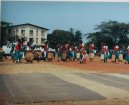Burundi
Burundi: Travel tips, articles, photos, gallery, cities database, population, pics, flags, statistics, free maps online
Back to Countries, Click to read the whole article: Burundi
| Introduction - Burundi: | | Location - Burundi: | | People - Burundi: | | Government - Burundi: | | Economy - Burundi: | Economy overview | Burundi is a landlocked, resource-poor country with an underdeveloped manufacturing sector. The economy is predominantly agricultural with more than 90% of the population dependent on subsistence agriculture. Economic growth depends on coffee and tea exports, which account for 90% of foreign exchange earnings. The ability to pay for imports, therefore, rests primarily on weather conditions and international coffee and tea prices. The Tutsi minority, 14% of the population, dominates the government and the coffee trade at the expense of the Hutu majority, 85% of the population. An ethnic-based war that lasted for over a decade resulted in more than 200,000 deaths, forced more than 48,000 refugees into Tanzania, and displaced 140,000 others internally. Only one in two children go to school, and approximately one in 15 adults has HIV/AIDS. Food, medicine, and electricity remain in short supply. Political stability and the end of the civil war have improved aid flows and economic activity has increased, but underlying weaknesses - a high poverty rate, poor education rates, a weak legal system, and low administrative capacity - risk undermining planned economic reforms. Burundi grew about 5 percent in 2006. Delayed disbursements of funds from the World Bank may add to budget pressures in 2007. Burundi will continue to remain heavily dependent on aid from bilateral and multilateral donors. | | Gdp purchasing power parity | $5.781 billion (2006 est.) | | Gdp official exchange rate | $776 million (2006 est.) | | Gdp real growth rate | 3.8% (2006 est.) | | Gdp per capita ppp | $700 (2006 est.) | | Gdp composition by sector | agriculture: 44.9%
industry: 20.9%
services: 34.1% (2006 est.) | | Labor force | 2.99 million (2002) | | Labor force by occupation | agriculture: 93.6%
industry: 2.3%
services: 4.1% (2002 est.) | | Unemployment rate | NA% | | Population below poverty line | 68% (2002 est.) | | Household income or consumption by percentage share | lowest 10%: 1.8%
highest 10%: 32.9% (1998) | | Distribution of family income gini index | 33.3 (1998) | | Inflation rate consumer prices | 11% (2006 est.) | | Investment gross fixed | 11.9% of GDP (2006 est.) | | Budget | revenues: $239.9 million
expenditures: $297 million; including capital expenditures of $NA (2006 est.) | | Agriculture products | coffee, cotton, tea, corn, sorghum, sweet potatoes, bananas, manioc (tapioca); beef, milk, hides | | Industries | light consumer goods such as blankets, shoes, soap; assembly of imported components; public works construction; food processing | | Industrial production growth rate | 18% (2001) | | Electricity production | 137 million kWh (2004) | | Electricity consumption | 157.4 million kWh (2004) | | Electricity exports | 0 kWh (2004) | | Electricity imports | 30 million kWh; note - supplied by the Democratic Republic of the Congo (2004) | | Oil production | 0 bbl/day (2004) | | Oil consumption | 3,100 bbl/day (2004 est.) | | Oil exports | NA bbl/day | | Oil imports | NA bbl/day | | Oil proved reserves | 0 bbl | | Natural gas production | 0 cu m (2004 est.) | | Natural gas consumption | 0 cu m (2004 est.) | | Current account balance | -$57.84 million (2006 est.) | | Exports | $55.68 million f.o.b. (2006 est.) | | Exports commodities | coffee, tea, sugar, cotton, hides | | Exports partners | Germany 18%, Switzerland 8.6%, Belgium 5.5%, Rwanda 5.4%, Italy 4.6% (2006) | | Imports | $207.3 million f.o.b. (2006 est.) | | Imports commodities | capital goods, petroleum products, foodstuffs | | Imports partners | Kenya 19%, Italy 15.1%, Tanzania 11.1%, Belgium 9.7%, Uganda 5.6%, France 4.5%, India 4.3% (2006) | | Reserves of foreign exchange and gold | $87.69 million (2006 est.) | | Debt external | $1.2 billion (2003) | | Economic aid recipient | $105.5 million (2003) | | Currency code | Burundi franc (BIF) | | Exchange rates | Burundi francs per US dollar - 1,030 (2006), 1,138 (2005), 1,100.91 (2004), 1,082.62 (2003), 930.75 (2002) | |
| Communications - Burundi: | | Transportation - Burundi: | | Military - Burundi: |
This page was last updated on 16 September, 2007
Source: CIA >>> |




